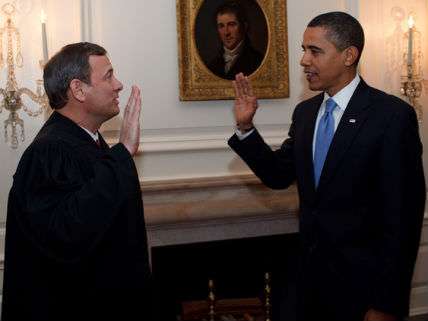Obamacare and the Perils of Conservative Judicial Restraint
Conservative judicial restraint came home to roost.

Republican presidential hopeful Jeb Bush recently appeared on Hugh Hewitts's talk radio show and denounced the Supreme Court's Obamacare ruling in King v. Burwell. According to Bush, if he becomes president, he plans on appointing new justices who will do the right thing in similar cases in the future. How will he find the appropriate justices to appoint? "You focus on people to be Supreme Court justices who have a proven record of judicial restraint," Bush declared.
Writing at the Volokh Conspiracy, Georgetown law professor Randy Barnett practically doubles over in laughter at Bush's preposterous solution. If Republican presidents keep appointing justices committed to "judicial restraint" and "judicial deference," Barnett points out, Republican presidents will keep getting deferential justices like John Roberts who write deferential majority opinions like the Obamacare cases King v. Burwell and National Federation of Independent Business v. Sebelius. Barnett explains why:
For years, "judicial restraint" has been primarily about not thwarting the will of "democratic majorities." There are myriad doctrines to accomplish this. For example, you adopt a "presumption of constitutionality" that cannot be rebutted. Or find a "saving construction" of a statute to avoid finding it unconstitutional. Or you "defer" to administrative agencies' interpretation of statutes. Or you make a statute "work" as the "legislature intended" (even if that means ignoring the plain or natural reading of its words).
Many good conservatives truly wanted Obamacare invalidated in NFIB because it was unconstitutional. And they then sincerely wanted it to be enforced according to its terms in King. But selecting judges with the judicial mindset of "judicial restraint" and "deference" to the majoritarian branches leads to the results we witnessed in NFIB and King. If conservatives persist in supporting presidents who select judges on this basis, they will persist in being disappointed.
In a piece last Friday, I made a related point:
In the approving words of National Review editor Ramesh Ponnuru, [judicial deference] "is best understood as a finger on the scales, tipping judges in close cases against invalidating the actions of Congress or state or local governments."
Sound familiar? "It is not our job," John Roberts wrote in 2012, tipping the scales in favor of Obamacare, "to protect the people from the consequences of their political choices." He tipped the scales once again yesterday in King v. Burwell. "In every case we must respect the role of the Legislature, and take care not to undo what it has done."
Whether conservatives like it or not, John Roberts is the heir to a well-established school of conservative legal philosophy.


Show Comments (38)